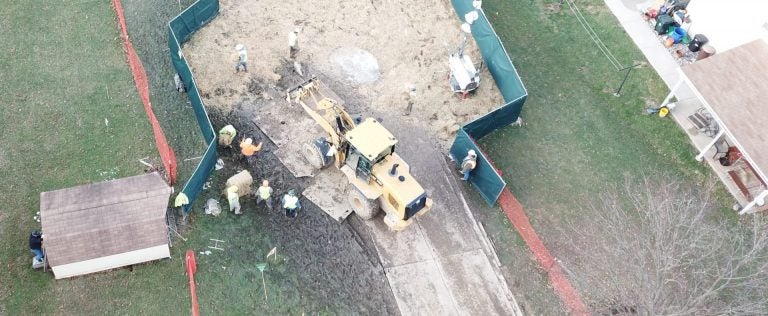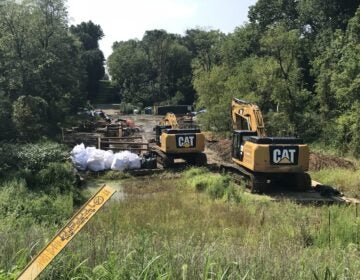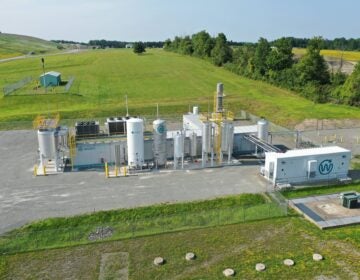DEP approves changes to Mariner East construction methods at three troubled sites in Delaware, Chester counties
Mariner East construction at three sites that require drilling through porous limestone can shift from horizontal directional drilling to open trench.

Crews work to stabilize sinkholes in a West Whiteland Township, Chester County neighborhood on March 3. The sinkholes appeared near a construction site for the Mariner East 2 pipeline. (Eric Friedman)
This story originally appeared on StateImpact Pennsylvania.
___
Construction at three troubled Mariner East pipeline sites in Chester and Delaware counties will shift from the planned horizontal directional drilling (HDD) to open trench, a method that risks greater damage to the surface area but avoids further drilling mud spills and sinkholes that have plagued the project in southeast Pennsylvania.
The Department of Environmental Protection approved the amended permits proposed by pipeline builder Energy Transfer/Sunoco after construction caused several pollution events and risks to worker safety at the three sites.
The company chose a route through southeastern Pennsylvania that required drilling through unstable rock formations like limestone that has caused dozens of spills, sinkholes and damage to drinking water. Following a 2017 lawsuit by environmental groups over the company’s pipeline work, an order agreed to by all parties requires the company to submit “reevaluation reports” to DEP whenever operations cause drilling mud spills, also referred to as “inadvertent returns.” Those reports are evaluated by a geologist and are open to public comment.
The move is not related to a recent order by DEP to Energy Transfer to re-route a section of the pipeline to avoid further damage to Chester County’s Marsh Creek Lake. In August, drilling at nearby pipeline construction site 290 caused about 8,000 gallons of drilling mud to flow into the lake, the main attraction at Marsh Creek State Park and popular to birders, boaters and anglers. Energy Transfer has yet to agree to that order, and could still file an appeal.
The three sites now approved to shift to open trench digging are in Delaware County’s Middletown Township, and Chester County’s West Whiteland and Upper Uwchlan townships.
Energy Transfer abandoned drilling at the Delaware County site after several attempts led to drilling mud spills into tributaries of Chester Creek. Drilling mud is primarily composed of bentonite clay, a non-toxic substance that can smother aquatic insects if present in large amounts.
Drilling at one of the Chester County sites, which crosses a major highway known as the Exton Bypass, led to both drilling mud spills and a sinkhole, causing the company to abandon the plan. The new plan for both Chester County sites will use a combination of open trench and a conventional direct drill beneath waterways.
WHYY is your source for fact-based, in-depth journalism and information. As a nonprofit organization, we rely on financial support from readers like you. Please give today.






